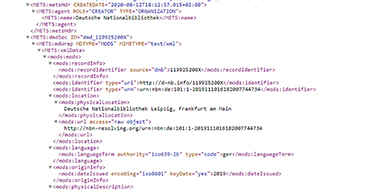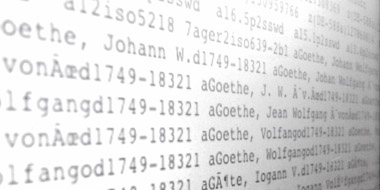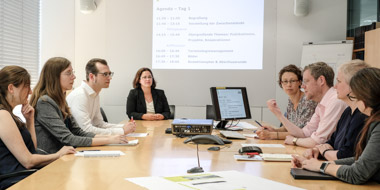Research needs data, research needs content
As an infrastructural science partner, the German National Library provides an extensive range of services for science and research. DNBLab, for example, with its multitude of tools, open access data and resources, is the main point of contact for anyone interested in text and data mining. The Scientific Service provides support at all stages of the research process for researchers whose projects involve DNB holdings. The DH call and DH fellowships support innovative research ideas in the digital humanities. Our aim with these is to secure Germany's archived cultural heritage a dynamic place in society.
Access to digital collections
With regard to availability, a distinction is made between publications with no access restrictions, publications with access restrictions, metadata and authority data. Please visit our website for more information about how they differ and what the differences mean in practice.
Open Access: Access to digital collections
DNBLab
We can offer the German National Library's entire holdings of bibliographic and authority data, metadata on individual, freely available content collections and the use, with certain provisos, of our collection of digital objects. Information about how to access our free data, object files and full texts by download and through various interfaces is available in DNBLab.
DNBLab: Access to data sets and digital objects
If you would like to conduct research using other data holdings from the German National Library, please contact us at:lab@dnb.de.
Support programmes
The German National Library supports academia and research, and offers various text and data mining services for this purpose. Since 2020, we have been publishing an annual digital humanities call (DH call), requesting applications from researchers who wish to work with our data and digital objects.
2022 we expanded our offer in support of DH research to include fellowships for the first time. Our objective is to encourage young researchers with a first academic degree and experience in digital humanities to carry out research using the German National Library’s data and collections.
DH Call
Are you planning or already working on a DH research project and need access to metadata or digital content from the German National Library? We support research projects as part of our DH Call and provide the necessary data and infrastructure. The DH call also offers the opportunity to work with copyright-protected material in accordance with the provisions of property rights (Urheberrechtsgesetz) § 60d.
Current DH Call
DH fellowships
Are you interested in working with our data and already have some experience with digital humanities methods? Our DH fellowships offer the opportunity to conduct research on our metadata and our free digital content. For this purpose, we grant fellowships for a period of 3 to 6 months including a monthly living allowance.
Current call for DH fellowships
Text and Data Mining
Besides its collection of physical media (34.8 million objects), the German National Library has also established an extensive digital collection of 14.9 million objects including e-books, e-journals, e-papers and other digital objects. In accordance with property rights (Urheberrechtsgesetz) § 60d rights holder legislation, these are available for automated analysis (Text and Data Mining) for research purposes.
Automated analysis is however permitted solely on infrastructure and in rooms belonging to the German National Library.
If you are interested in this service, please send us a short description of your project or contact us in advance at: DH-Call@dnb.de.
Services
The DNB is happy to support your research by offering standardised data copies free of charge. You can also use our metadata services for Data selection according to your own criteria. There is a charge for this service.
In accordance with German law on copyright and intellectual property rights (Urheberrechtsgesetz) § 60d, you may digitise printed media for the purpose of academic research. There is also a charge for this service.
If your research requires German National Library metadata that is not yet freely available, please contact metadatendienste@dnb.de.
Spheres of activity and findings
The German National Library is increasing its co-operation with the Digital Humanities in the form of workshops and research collaborations, with the aim of exchanging expertise with experts in the field, finding new ways of working together and mining the potential of its own digital data holdings. Initial publications and applications have highlighted the possibilities the German National Library’s digital collection can offer.
Projects
2022
DisKo: Establishing a diversity corpus (DisKo) as the foundation for algorithmic text analyses: Mareike Schumacher (TU Darmstadt) and Marie Flüh (University of Hamburg) are creating a diverse reference corpus in order to extract a training corpus which can then be annotated and subsequently used for the machine-learning of their gender classifier. The German National Library is supporting the project by digitising the required literature, through OCR recognition and by creating the corpus.
More information about the project: https://msternchenw.de/diversitaets-korpus/
The DNB catalogue as data-source and research object of digital historical press research: in this project, Erik Koenen (University of Bremen – ZeMKI) is researching the potential of the digital DNB catalogue as a research object in the context of newspapers. The German National Library is advising on the history of newspaper-collecting and its own collections of this medium, and is also providing the project with technical support.
FOREXSCIFI - Foresight Extraction from Science Fiction Literature: Jan Oliver Schwarz (TH Ingolstadt), Christoph Bläsi (Univesity of Mainz) and Markus May (LMU München) are analysing science-fiction literature in order to generate statements on potential future developments in technology, ecology, economics, food production, society and communication as well as their interdependencies. To this end, the German National Library is creating a corpus, digitising a selection of literature and providing access to its infrastructure.
2021
Secret best-sellers: Christine Haug (LMU Munich) researches the history of German dime novel from its beginnings to the mid-20th century. The German National Library is supporting this project by digitising dime novels and providing access to it via the own infrastructure.
Leipzig as the centre of the global tobacco and fur trade between the two world wars: On the basis of academic journals, Werner Scheltjens (University of Bamberg) analyses the role of Leipzig as the centre of the international tobacco and fur trade in the time between the two world wars. The German National Library is supporting this project by digitising serial publications and providing access to these via the own infrastructure.
Mapping Translated German Fiction with the German National Library Catalogue: Lisa Maria Teichmann (McGill University, Montreal, Canada) is conducting quantitative analyses of translations of German fiction. The German National Library is supporting this project by providing access to bibliographic metadata and giving advice on how to analyse it.
2020
Fascism in the eyes of the (inter)national public: Lutz Klinkhammer, Jörg Hörnschemeyer (both from the German Historical Institute in Rome) and Jan Rohden (Max Weber Foundation) are investigating the perception and portrayal of Fascism and National Socialism in the press and publishing landscape of 1933–1945. The German National Library is providing full copies of the GND, bibliographic data, metadata and full texts from the Exile Press for this purpose.
Freedom of expression and hate speech as reflected in the Network Enforcement Act (NetzDG): Jens Pohlmann (University of Bremen) is investigating and comparing statements on matters of network policy found in IT blogs and websites. We are providing a comparative e-paper corpus consisting of 10 daily newspapers on our infrastructure for analytical purposes.
“Fremdes in Kochbüchern” (Otherness in cookery books): Christoph Bläsi (Johannes Gutenberg University of Mainz) and Edith Blaschitz (Danube University Krems) are researching the processes involved when “foreign” foods are assimilated into German-language cookery books. For this, the DNB is providing a corpus of approx. 6,000 authentic digital cookery books on its own infrastructure for automatic analysis. To the video
Pseudonyms in literature: Jörg Lehmann (Eberhard Karls University of Tübingen) is using 23,000 GND records provided by the DNB to investigate the motives and goals of authors who write literary works under pseudonyms.
2018
Macroanalytical study of dime novels: Fotis Jannidis, Leonard Konle (both from the Julius- Maximilians-Universität of Würzburg) and Peter Leinen (German National Library) are conducting quantitative analyses of so-called dime novels and comparing them with classical literature. We are placing our infrastructure and a corpus of approx. 40,000 objects at their disposal for the purpose of performing automated analyses.
Fellowship research projects
Leon Munz: Dissertations on information science – an analysis of a heterogeneous discipline
Information science is an especially heterogeneous and multidisciplinary academic discipline. Its thematic boundaries and focal points are constantly evolving as the result of public requirements and the influence of a technological imperative. These circumstances make it considerably more difficult to identify dissertations relevant to the discipline by means of automated processes based on existing classification systems such as Dewey decimal classification (DDC).
To solve this problem, an approach is to be developed that goes beyond the existing metadata to incorporate other attributes, such as institutes or contributors from the requisite full texts or online sources, for identification purposes. The aim of the project is the automated creation of a corpus of dissertations relevant to information science and a subsequent descriptive analysis of thematic trends in the discipline.
Suellen Dutra Pererira: Publish or Perish? Publications by women in the natural sciences in the catalogue of the German National Library, 1900 – 1970
Although the career path of women in the natural sciences is a popular topic in the sociology of science, there are few publications containing quantitative data on women’s publishing history. To close this gap, the “Publish or Perish?” project is evaluating the German National Library’s metadata from collections of works on mathematics, physics, chemistry, pharmacology and biology published between 1900 and 1970. With the aid of the quantitative analysis of bibliographic metadata, this project aims to answer questions such as: What proportion of natural sciences publications between 1900 and 1970 were written by women? Did successful female scientists publish as much on average as their male colleagues? Did women publish more during certain phases within this period? To evaluate potential network relationships between the female authors, the project will use GND data on the authors and their publications. Finally, by analysing bibliographic and GND data, the project will assess whether women’s success in the natural sciences depended on how often they published and on their early participation in institutionalised scientific networks.
Hendrikje Schauer: Literary public 1945 – 1962: DH-based analysis of DNB data
One of the recurring topoi of critical public discourse in the German post-war era is the claim made by literary authors that they were not (or were no longer) able to publish freely and were being censored and/or marginalised. These problematic claims, some of which have been adopted in research, are to be analysed precisely based on DNB data.
In the context of the intense engagement with the literature of the post-war era, this project focuses on public perspectives and public practices. The project combines DH-based approaches with classic methods of literary criticism in the form of textual interpretation informed by an awareness of intellectual history and the law.
Nicole Schwitter: Age-related, period-related and cohort-related effects on the moods and topics of literary works
Literature is highly prized in Germany, and various studies have highlighted the positive effects of reading and writing on people’s psyche. What people read and write about changes with time as well as within a lifetime: not only are there books written specifically for children and young people, but there are also differences in the genre preferences of adults of different generations. In general, literary history is shaped by eras during which specific topics and styles are particularly prevalent. This research project will closely examine the temporal element of thematic trends and moods in German literature. Temporal differences can reflect the effects of different eras or also age-specific changes or generational differences, as typically distinguished between in demographic research. The definition of eras in literary research is based on period effects. This research project will firstly analyse the temporal trends in literature based on the year of publication, and secondly engage with the authors’ potential age-related and generational effects, which are generally paid very scant attention in literary studies. The titles of every book published in Germany since 1913 will be evaluated to derive key concepts and moods. Using the Integrated Authority File (GND) and the free platform Wikidata, the book data will be expanded with data on the authors. In this context, the catalogue data will be treated as a panel data record. The aim of this approach is to separate the specific influences of age, cohort membership and effects of contemporary history in order to explain moods and thematic focuses in German literature and create a complete quantitative overview.
Publications
Döhl, Frédéric: Digital Turn – Gedächtnisinstitutionen und Digital Humanities. Zwischenbericht aus einer Workshop-Reihe der Deutschen Nationalbibliothek, in: ZfBB – Zeitschrift für Bibliothekswesen und Bibliographie 67/3-4 (2020), S. 213-230. http://dx.doi.org/10.3196/1864295020673496
Frédéric Döhl, Dorothea Zechmann: Digital Humanities und Recht: Zu den neuen Regeln für das Text und Data Mining (TDM) und ihrem strategischen Potential für die Bibliotheken, in b.i.t. online 23 (2020) Nr. 4, S. 397-404. https://www.b-i-t-online.de/heft/2020-04-fachbeitrag-doehl.pdf
Döhl, Frédéric: Digital Humanities und Bibliotheken. Über technisch-organisatorische Infrastruktur hinausgedacht, in: ZfBB – Zeitschrift für Bibliothekswesen und Bibliographie 66/1 (2019), S. 4-18. http://dx.doi.org/10.3196/186429501966114
Döhl, Frédéric: Deutsche Nationalbibliothek verstärkt Engagement in den Digital Humanities, in: Dialog mit Bibliotheken 2, 2019, S. 9-11. urn:nbn:de:101-2019081635
Fischer, Frank; Jäschke, Robert: Liebe und Tod in der Deutschen Nationalbibliothek: Der DNB-Katalog als Forschungsobjekt der digitalen Literaturwissenschaft. In: DHd2018: ”Kritik der digitalenVernunft”, Digital Humanities im deutschsprachigen Raum, Cologne, Germany. 261-266. https://hal.archives-ouvertes.fr/hal-01787558/document
Herrmann, J. Berenike; Grisot, Giulia; Gubser, Susanne; Kreyenbühl, Elias (2021): Ein großer Berg Daten? Zur bibliothekswissenschaftlichen Dimension des korpusliteraturwissenschaftlichen Digital Humanities-Projekts „High Mountains – Deutschschweizer Erzählliteratur 1880–1930“. In: 027.7 Zeitschrift Für Bibliothekskultur / Journal for Library Culture, 8(1). https://doi.org/10.21428/1bfadeb6.6e2feff6
Herseni, Johannes et al.: Die bibliografischen Daten der Deutschen Nationalbibliothek entfalten. In: Dialog mit Bibliotheken 1, 2018, S. 11-16. https://d-nb.info/115432141X/34
Jannidis, Fotis; Konle, Leonard; Leinen, Peter: Makroanalytische Untersuchung von Heftromanen. In: DHd 2019. Digital Humanities: multimedial & multimodal. Konferenz-abstracts. 2019, p. 167-172. https://zenodo.org/record/2596095#.Xde4jm5Fzct
Jannidis, Fotis; Konle, Leonard; Leinen, Peter: “Thematic Complexity”. DH Conference Abstracts 2019. Utrecht. https://dev.clariah.nl/files/dh2019/boa/0504.html
Schöch, Christof; Döhl, Frédéric; Rettinger, Achim; Gius, Evelyn; Trilcke, Peer; Leinen, Peter; Jannidis, Fotis; Hinzmann, Maria; Röpke, Jörg: Abgeleitete Textformate: Prinzip und Beispiele, in: Recht und Zugang 1.2, 2020, 160–175. DOI: https://doi.org/10.5771/2699-1284-2020-2-160
Teichmann, Lisa: Mapping German fiction in translation in the German National Library catalogue (1980-2020), 2023. https://escholarship.mcgill.ca/concern/theses/0p096d03z?locale=en
Vorndran, Angela; Grund, Stefan (2019): Using Graph Visualization to enhance representation and evaluation of work clusters. Paper presented at: IFLA WLIC 2019 - Athens, Greece - Libraries: dialogue for change. Session S15 - Big Data. In: Data intelligence in libraries: the actual and artificial perspectives, 22-23 August 2019, Frankfurt, Germany. http://library.ifla.org/id/eprint/2723
Vorndran, Angela (2018): Hervorholen, was in unseren Daten steckt! Mehrwerte durch Analysen großer Bibliotheksdatenbestände. In: o-bib. Das offene Bibliotheksjournal, Bd. 5 Nr. 4 (2018), S. 166–180. https://www.o-bib.de/article/view/5414/7411
Applications
Contact
Stephanie Palek: s.palek@dnb.de







